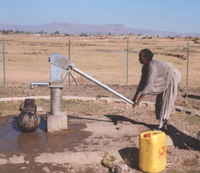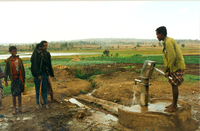Overview of Groundwater in Africa
Africa Groundwater Atlas >> Additional resources >> Overview of Groundwater in Africa
Groundwater in Africa
Advantages and Limitations of Groundwater
Groundwater is an invaluable resource in Africa. Groundwater has many advantages as a water supply source, particularly where populations are still largely rural and demand is dispersed across large areas. The main advantages and limitations of groundwater as a water resource are summarised in the table, below.
| Advantages | Limitatons |
| Found in most environments and usually available close to point of demand | In some environments, considerable investment is needed to locate and develop suitable sites |
| Generally excellent natural water quality & suitable for potable use with no prior treatment | There is increasing recognition of natural water quality constraints, such as arsenic and fluoride |
| Naturally more protected from contamination than surface waters | As human development increases, the threat of pollution needs to be assessed in relation to the nature of the intrinsic aquifer protection |
| Large volumes of natural storage & seasonal variations in amount or quality aren't usually significant. More drought resistant than surface waters | Groundwater can be vulnerable to over-abstraction, particularly in low productivity aquifers and/or as demand and the ability to abstract large volumes of water both grow. Long term changes in rainfall patterns can also impact on groundwater recharge and renewal |
| Lends itself well to principles of community management. Can be developed incrementally, often at relatively low cost/initial capital investment | As overall water supply coverage increases, more hydrogeologically difficult areas can remain unserved, and they become more costly to develop |
  |
Groundwater Occurrence in Africa
How and where groundwater occurs depends primarily on geology; geomorphology/weathering; and rainfall (both current and historic). The interaction between these three factors gives rise to complex hydrogeological environments with countless variations in the quantity, quality, ease of access to and renewability of groundwater resources. Developing groundwater resources therefore depends on a good understanding on hydrogeology.
Africa has huge diversity in geology, climate and hydrology, and as a result, the hydrogeology of Africa is hugely variable and challenging to characterise and understand.
Groundwater has excellent natural microbiological quality, and generally has adequate chemical quality for most uses. However problems can arise from the chemistry of groundwater in some circumstances: for example, high sulphate from some types of weathered basement and mudstones; or excessive hardness in limestone aquifers or sandstones cemented with carbonate material. Minor and trace constituents, which make up about 1% of the solute content of natural groundwaters, can also sometimes lead to health problems or make the water unacceptable for human and animal consumption. For example, high fluoride in some volcanic aquifers; elevated iron and manganese where groundwaters are anoxic; high arsenic in some unconsolidated sediments; and a lack of iodine in aquifers far from the sea (MacDonald and Davies, 2001).
Understanding Groundwater Resources
The sustainable development of groundwater resources depends on a good understanding of where and how groundwater exists, and how it is recharged and renewed. This will become more and more important in future, as pressure increases on Africa's groundwater resources because of growing population and increasing demands on water supplies - for domestic, including growing urban populations; agricultural (especially growing demand for irrigation); and industrial use. This understanding requires sufficient robust information on groundwater, and people with skills in hydrogeology and sustainable development. However, in many parts of Africa, both groundwater information and skilled personnel are in short supply.
For many parts of Africa, there is a lack of information on groundwater. This may be because data aren't being collected - or haven't been in the past; or because data aren't easily avaialble or accessible. This makes it very difficult to assess the groundwater resources. It can lead to inappropriate groundwater development - such as over-abstraction, or groundwater contamination - which can have long term implications for groundwater availability and quality.
However, there is also much work that has been done in many areas of African groundwater. This Atlas summarises some of the key issues and provides an overview of groundwater resources and hydrogeology across Africa, and links to further information. The country pages provide specific information by country; and the resource pages provide a continental overview of issues including:
Further Information
More information on groundwater in Africa is available from the Africa Groundwater Network (AGW-Net) - a professional network of hydrogeologists in Africa.
Quantitative Groundwater Maps for Africa
MacDonald, A.M. & Davies, J. 2000. A brief review of groundwater for rural water supply in sub-Saharan Africa. British Geological Survey Report WC/00/033.
MacDonald, A.M., Bonsor, H.C., Ó Dochartaigh, B.É. & Taylor, R.G. 2012. Quantitative maps of groundwater resources in Africa. Environmental Research Letters 7(2).
MacDonald, A.M. & Calow, R.C. 2009. Developing groundwater for secure water supplies in Africa. Desalination 248, 546-556. doi: 10.1016/j.desal.2008.05.100
Africa Groundwater Atlas >> Overview of Groundwater in Africa